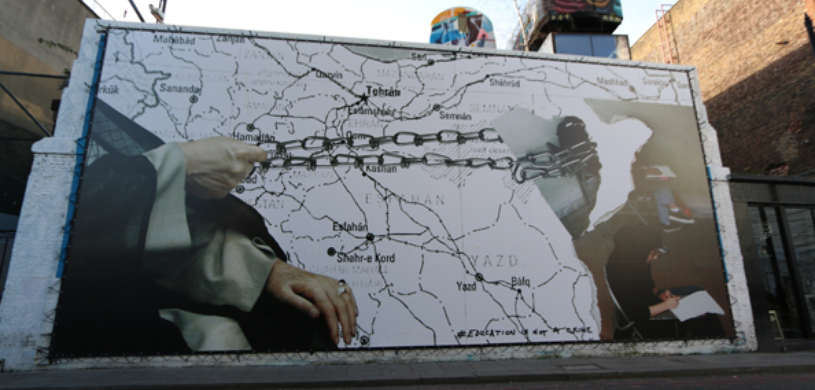The #NotACrime campaign revealed its latest mural by renowned collaborative artists kennardphillipps last week with their provocative image — of a map of Iran in chains — on the wall of Village Underground, a popular theater and concert venue in Shoreditch, East London.
The mural by kennardphillipps, which is free for the public to view, went live on Wednesday, February 24, where it will remain for a month. It replaced a mural by British artist and illustrator Dave the Chimp, which was also part of the #NotACrime initiative.
#NotACrime is a global arts campaign started by IranWire founder Maziar Bahari that uses street art and digital media to raise awareness of human rights in Iran, particularly the denial of higher education to thousands of young Iranian Baha’is, the country’s biggest religious minority.
British artist duo Peter Kennard and Cat Phillipps of kennardphillipps began producing artwork together back in 2002 on pieces that address social and political issues and “in response to the invasion of Iraq,” according to their website. The pair is best known for their acclaimed image of Tony Blair’s “selfie” Photo Op.
“As soon as we were approached to make this piece of work, I totally wanted to,” says artist Cat Phillipps. “This isn’t any different to the persecution of any other group in any other part of the world, and so this is very close to our interests. Highlighting injustices around the world is central to what we do in our work. We hope this huge image in London will encourage people to look at this issue of persecution.”
Despite their peaceful nature, Iranian Baha’is, of which there are at least 300,000 living in Iran, are all barred from studying and teaching at universities. #NotACrime was started to raise awareness of this injustice by mounting prominent murals in cities around the world created by acclaimed street artists. The campaign also encourages universities around the world to admit Iranian Baha’i students and celebrates the response of the Baha’is to their plight.
“Baha’is are banned in Iran from studying so we wanted to make an image that made that clear. We used photographic montage to put it together,” says Peter Kennard. “Education is vital in terms of allowing people to think of ideas and to develop their thinking about the world. The work breaks through all the seamless web of corporate imagery that we’re constantly bombarded with. If its gets people thinking in some way about issues and their relationship to society and politics, that’s as much as one can hope for.”
Baha’is are frequently jailed on false charges in addition to being denied access to higher education. Currently, there are 71 Baha’is imprisoned in Iran and more than 200 were executed in the early 1980s after the 1979 Islamic Revolution. State media also vilifies the Baha’is, while Baha’i-owned businesses are frequently shut down or attacked, and Baha’i cemeteries are desecrated.
“This campaign marries old and new forms of communication; street art, very similar to cave paintings, and modern social media activism. It sparks an important conversation,” says campaign founder Maziar Bahari, who also made the “Light A Candle” documentary to highlight Baha’I persecution in Iran. “I’m grateful that we’re able to shine a light on how the Iranian government is mistreating the Baha’is as I believe it serves as a barometer for understanding whether Iran is ready to operate like a modern and rational government.”
Despite the ban on higher education, thousands of Baha’is are currently studying through an underground education system in Iran known as the Baha’i Institute for Higher Education (BIHE), which was set up in 1987 and is now recognized by academic institutions around the globe.
According to the official BIHE website, it offers Iranian Baha’is a choice of more than 1050 courses ranging from Persian Literature to Applied Chemistry and accepts an average of about 450 students every year. Much like other students in Iran, BIHE applicants must meet rigorous academic requirements and pass a national entrance exam to be accepted. But given that Baha’i students and teachers are forbidden from attending or teaching at regular universities in Iran, classes must be held in secret at peoples’ homes with the threat of arrest a part of daily life.
#NotACrime began in New York City in September 2015 with 11 murals on education equality and freedom of expression across the city. Leading street artists from around the world, including the United States, Brazil, Argentina, Italy, and South Africa all painted artworks designed to provoke conversation about the Iranian government’s long history of violating the human rights of its citizens.
The campaign has since spread to Rio de Janeiro and Brasilia, Cape Town and Johannesburg, and Sydney.
Find this latest mural at 54 Holywell Lane, Shoreditch, London.

Leave a Reply